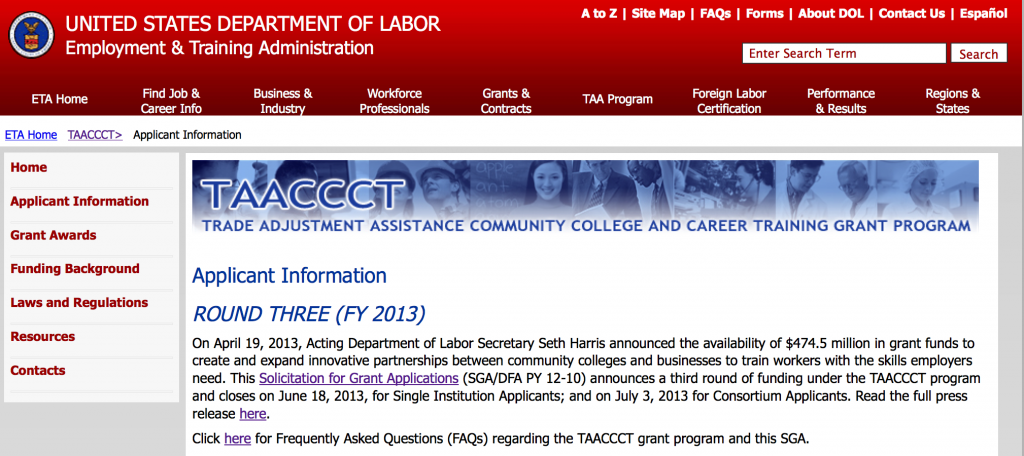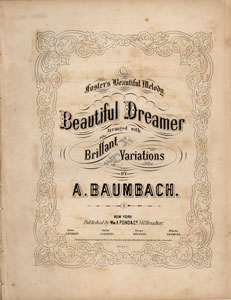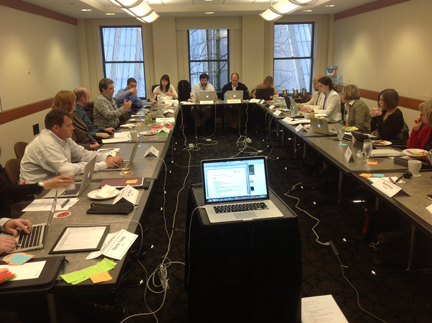Third Round of TAACCCT Grants Announced by US Department of Labor
vendredi 26 avril 2013 à 02:29On April 19, 2013 US Acting Secretary of Labor Seth D. Harris announced the third annual round of the Trade Adjustment Assistance Community College and Career Training Program (TAACCCT) grant program. The press release states that the current round of grants available is $474.5 million bringing the total 2011-13 program investment to nearly $1.5 billion. A fourth round is planned for 2014. Information on all the rounds is available here.
Funding is targeted at expanding innovative partnerships between community colleges and employers. All education and career training program strategies developed through grant funds have employer engagement and use labor market information to focus training on local economic needs. This years Solicitation for Grant Applications (SGA) says the TAACCCT programs aim is to help “adults acquire the skills, degrees, and credentials needed for high-wage, high-skill employment while ensuring needs of employers for skilled workers are met”.
In addition to partnerships TAACCCT stimulates innovation by requiring applicants to build five core elements into their initiatives:
1. Evidence-Based Design
2. Stacked and Latticed Credentials
3. Transferability and Articulation of Credit
4. Advanced Online and Technology Enabled Learning
5. Strategic Alignment
This years SGA even encourages the use of Massive Open Online Courses (MOOCs).
Another innovation, which DOL has maintained in all three rounds of the TAACCCT program, is the requirement for TAACCCT grantees to make all grant funded curricula and training materials Open Educational Resources (OER) by licensing them with a Creative Commons Attribution 3.0 license (CC BY).
This year’s SGA states:
- “The purpose of the CC BY licensing requirement is to ensure that materials developed with funds provided by these grants result in Work that can be freely reused and improved by others.”
- “To ensure that the Federal investment of these funds has as broad an impact as possible and to encourage innovation in the development of new learning materials, as a condition of the receipt of a TAACCCT grant, the grantee will be required to license to the public all work (except for computer software source code, discussed below) created with the support of the grant under a Creative Commons Attribution 3.0 (CCBY) license. Work that must be licensed under the CCBY includes both new content created with the grant funds and modifications made to pre-existing, grantee-owned content using grant funds.”
- “This license allows subsequent users to copy, distribute, transmit and adapt the copyrighted Work and requires such users to attribute the Work in the manner specified by the grantee. Notice of the license shall be affixed to the Work. For general information on CCBY, please visit http://creativecommons.org/licenses/by/3.0“
TAACCCT academic resources developed by the first round of grantees for industry sectors such as health, manufacturing, energy, transportation, and information technology, will become available for reuse in 2014 followed by additional resources from subsequent rounds. What a boon to education and the economy.
Congratulations to the Department of Labor and the Department of Education for their leadership and foresight in requiring publicly funded educational resources be openly licensed in a way that allows them to be reused and continuously improved. This innovation will benefit students, educators, and industry.
Creative Commons remains committed to supporting TAACCCT grantees in deploying and leveraging the CC BY requirement. See OPEN4us.org for a current list of TAACCCT grantee services Creative Commons offers in partnership with Carnegie Mellon University Open Learning Initiative, Center for Applied Special Technology, and the Washington State Board for Community & Technical Colleges.



